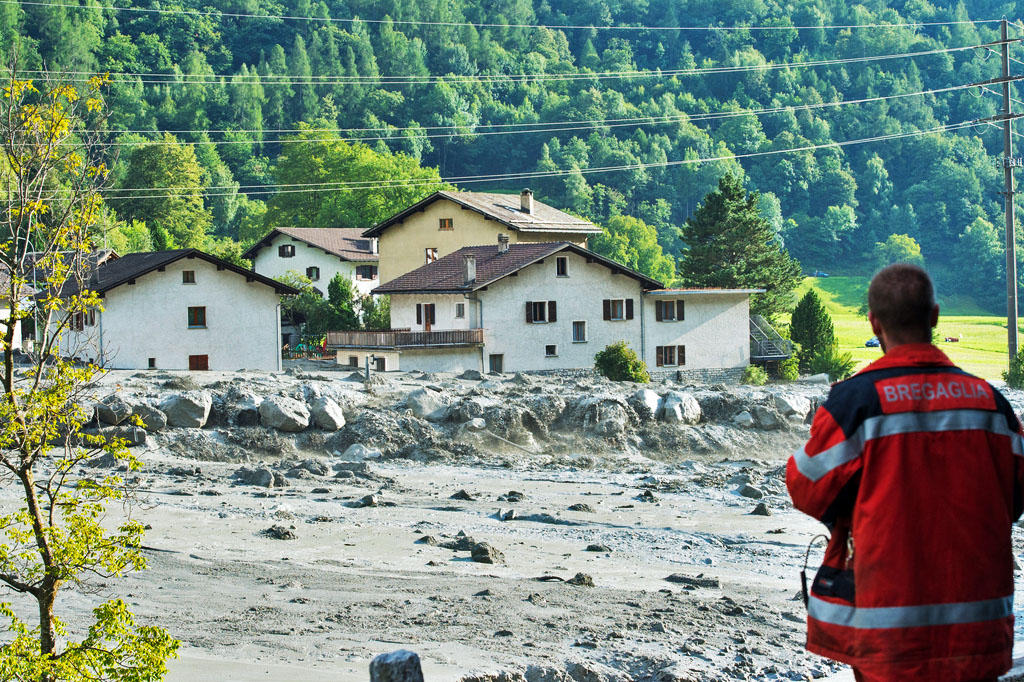
‘Little chance of survival’ for missing landslide victims

Intensive rescue efforts have been unable to locate eight people missing since a massive landslide struck in a remote valley in eastern Switzerland on Wednesday. Cantonal police say it is unlikely they will be found alive.

More
Swiss mountain moved 10cm a year before crashing down
Rescuers are using a helicopter, dogs, thermal imaging and mobile phone location devices to look for eight hikers and climbers – from Switzerland, Germany and Austria – who have been missing since the natural disaster narrowly missed the village of Bondo in canton Graubünden, near the Italian border.
Austria’s foreign ministry said a married Austrian couple were among those unaccounted for. No children or locals from the region were among those reported missing.
The search had been called off after nightfall on Thursday for safety reasons. Police have sealed off airspace for a five-kilometre radius until Monday to give priority access to rescuers.
One hundred inhabitants of Bondo were evacuated as a precaution and some were allowed to return home in the course of Friday morning.
Hikers from nearby huts were also airlifted after rocks and mud hit the area. About 120 rescue workers are in the region.
A separate group of six people also reported missing were later located unharmed in Italy, a Graubünden police spokeswoman said.
PLACEHOLDER
Wednesday’s landslide sent about four million cubic metres (140 million cubic feet) of material crashing down the mountain, senior police official Andrea Mittner said. Buildings were damaged and television images showed a trail of destruction left by a river of mud and stone.
It is believed the landslide was caused by a combination of thawing permafrost and water pressure dislodging rocks.

More
Search for missing in landslide-hit Bondo
The authorities were alerted by an automatic alarm system that had been set up in the region after a massive landslide in 2012 down Piz Cengalo, the source of the rocks on Wednesday.
In 2013, 60% of locals voted in favour of spending CHF4.5 million ($4.7 million) on a flood prevention project that involved relocating a campground, widening the riverbed and building a concrete wall to shield the village.
Thawing permafrost and heavy rainfall have been responsible for several fatal landslides or rockslides in recent years in Switzerland.
Thirteen people were killed by a landslide in Gondo, a small village in canton Valais near the border with Italy, in 2000. The landslide was triggered by days of torrential rainfall.
In 2003, 90 climbers had to be airlifted off the Matterhorn after an unusually large part of the mountain came tumbling down. No-one was hurt, but climbing was temporarily suspended.
In May 2006, Switzerland’s main north-south road axis through the Alps – the Gotthard – was temporarily closed following a rockslide, which crushed a car killing two people.
Two months later, 400,000 cubic metres of rock fell from one of Switzerland’s most iconic mounrains – the Eiger. No-one was injured or property damaged in the incident.
Heavy rainfall was again responsible for a landslide that killed two people in Lugano, canton Ticino, in November 2014.
The particularly warm summer of 2015, combined with precipitation at high altitudes, resulted in a significantly higher number of rockslides. The biggest rockslide that year happened in September when 80,000 cubic metres of rock fell in canton Valais.
In July of this year scientists warned of a heightened risk of rockslides in the Moosfluh mountain range flanking Switzerland’s longest glacier, the Aletsch. Extra sensors have been installed after increased slippage on the mountainside was observed.
Having studied the same area, scientists at Zurich’s Federal Institute of Technology issued a report showing a direct linkage between retreating glaciers and rockslides.

In compliance with the JTI standards
More: SWI swissinfo.ch certified by the Journalism Trust Initiative

























You can find an overview of ongoing debates with our journalists here . Please join us!
If you want to start a conversation about a topic raised in this article or want to report factual errors, email us at english@swissinfo.ch.